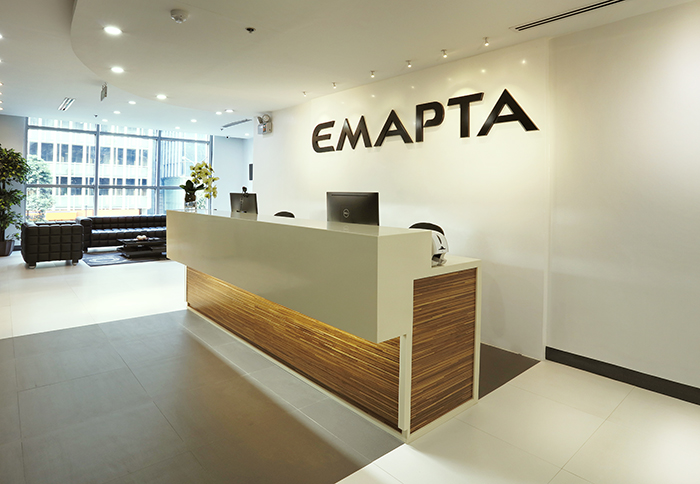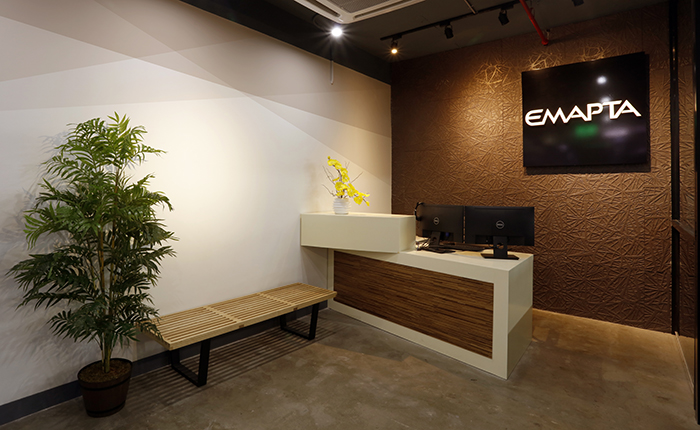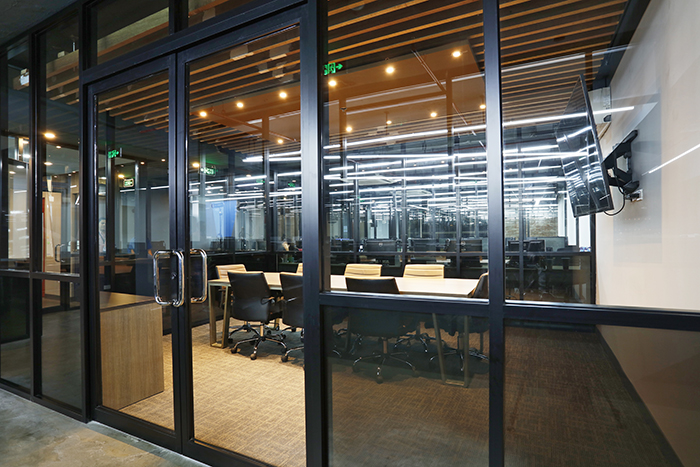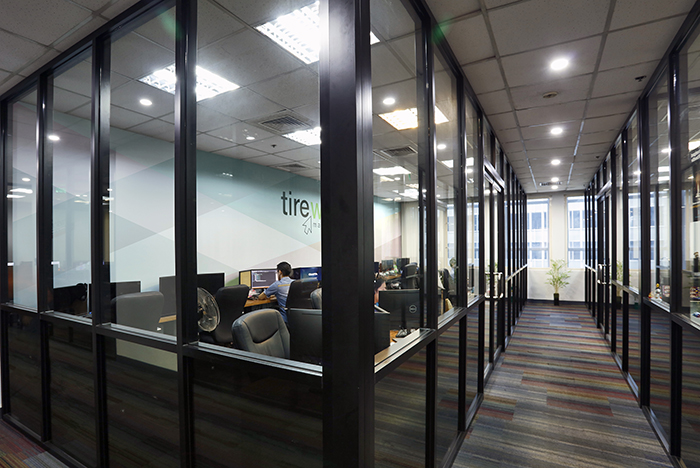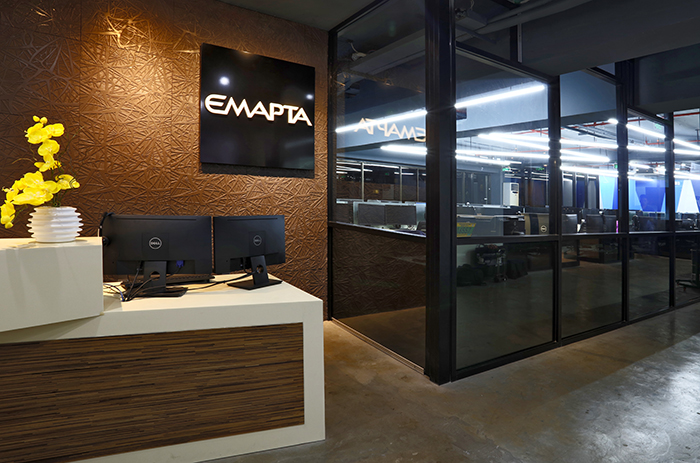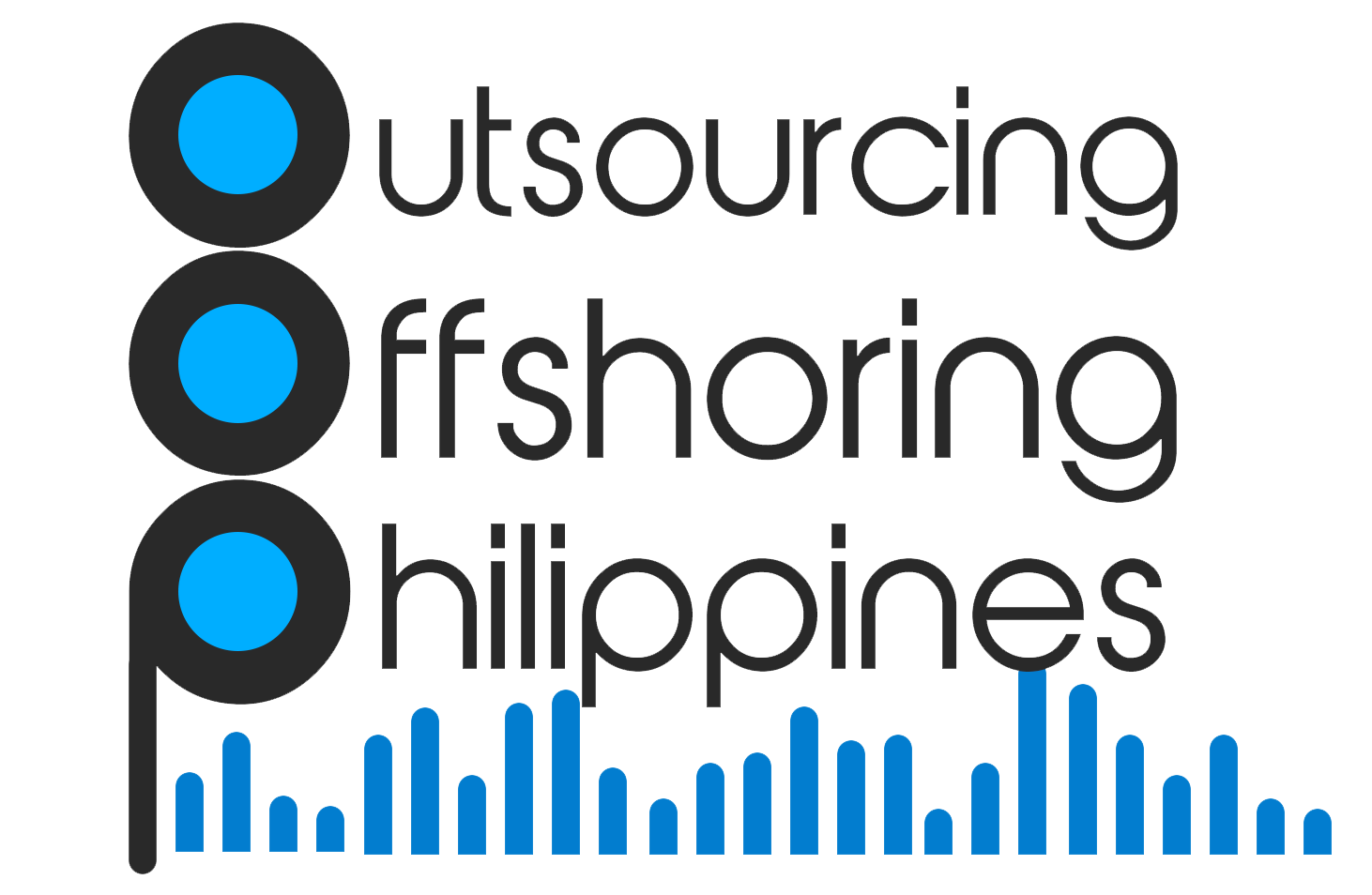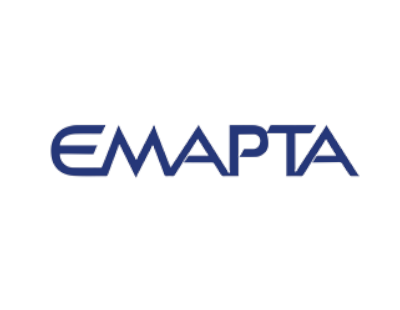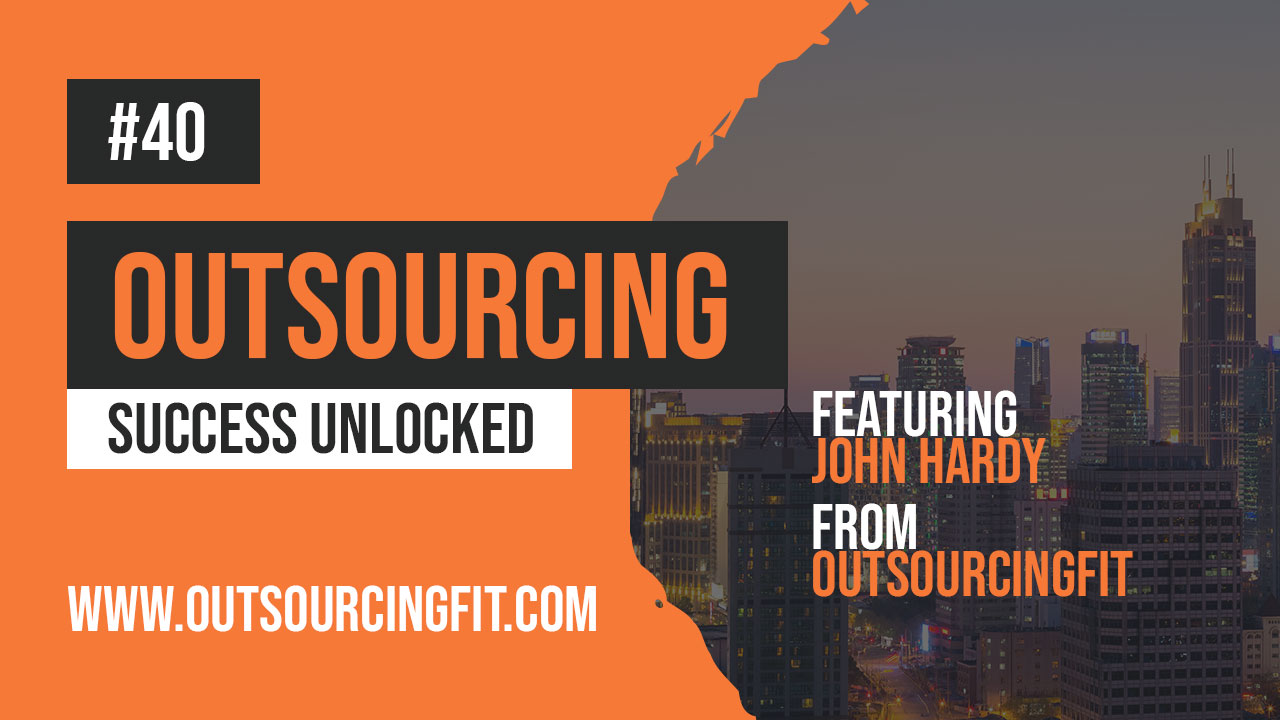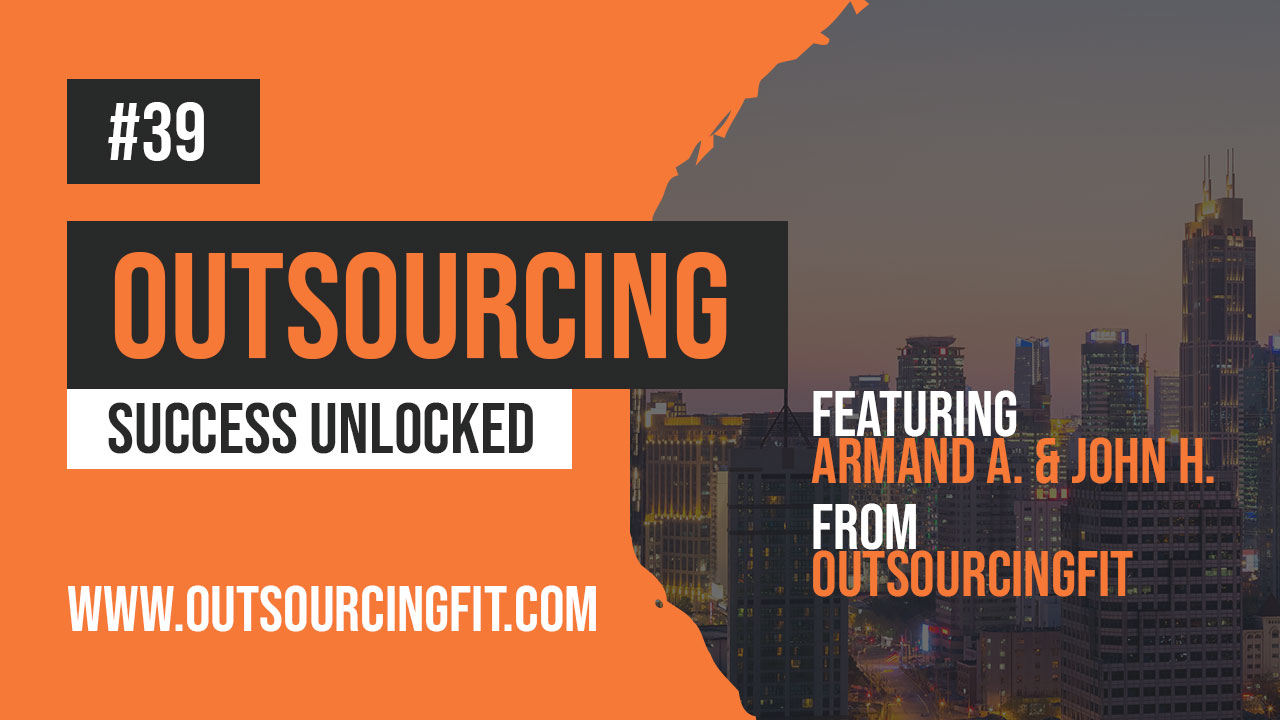Back in 2004, Tim Vorbach outsourced a call center work to a BPO in the Philippines and he was surprised by how efficient and cost-effective the service was. Tim realised that the Philippines offers an enormous pool of talent, which can perform not just voice work, but a whole range of knowledge work – the accounting, marketing, customer service, a whole range of services. He then decided to set up his own back-office operations in the Philippines for a successful national business in Australia, giving birth to EMAPTA.
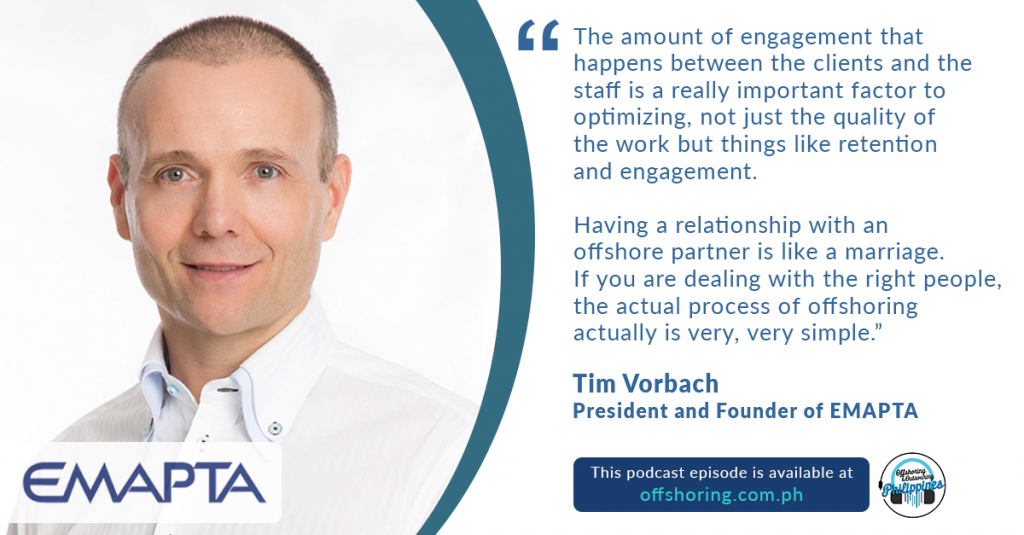
EMAPTA, which came from the initials of his family – Elizabeth, Mark, Amanda, Paul, Tim and Adrian – has helped hundreds of small businesses in Australia and created hundreds of jobs for highly talented and skilled Filipinos since 2005. They have clients in Australia, New Zealand, UK, US, Middle East and SE Asia.
EMAPTA specialises in General Business, Accounting and Financial Services, Legal, Marketing, IT Support, Media, Transport and Logistics, and Retail. As the motto of EMAPTA says, “Whatever your business is, and how many people you need to hire, if the skills required can be sourced in the Philippines, then the activities can be offshored with EMAPTA.”
Henry Acosta: Welcome to the Outsourcing and Offshoring Philippines podcast. Joining us today is Tim Vorbach, the Founder, President and Chief Visionary Officer of EMAPTA. Tim is a very successful entrepreneur and he is an award-winning businessman. He is joining us today to talk about his company that he founded, EMAPTA – what it is and what it’s all about. Welcome to the show Tim and thanks for coming to the show.
Tim Vorbach: Thanks Henry.
Henry Acosta: Hey Tim, can you give us a brief intro about yourself and how you got started with the BPO industry?
Tim Vorbach: Thanks Henry. My name is Tim Vorbach. I’m an Australian and the Founder and CEO of EMAPTA. About like 2004, we outsourced some call-center work to a BPO in the Philippines. And we were surprised by how effective the service was and also how cost-effective it was. And it certainly became a very important lead generating strategy for one of my companies in Australia. It happened to the point that it became the most relied on lead strategy. We had 60,000 relying on the leads on the outbound telemarketing it was coming from this BPO. So I decided with my business partner to come off to the Philippines and see if we could improve them more on the service and peps expand that even further. And the day that they got arrived in the Philippines, it was just so obvious to me on this enormous pool of talent that was really sitting on Australia’s doorsteps. That could be doing not just voice work but a whole range of knowledge work – the accounting, marketing, customer service, a whole range of services. We’re only looking at one particular aspect here so I started to offshore a whole range of hosts almost immediately through this BPO. The problem with the BPO model is that it’s so much the opposite of what we do and what the EMAPTA staffing platform model is about. A BPO traditionally has been quite post about how it does things, that’s its ability to retain value and its margins and the customers are generally interested in buying up an outcome to do so – papers, service or paper outcome. But really what I wanted was I wanted to have completely control over the staff and I needed complete transparency as to what each the staff are being paid because I really needed to know that was Mary better than Peter and if so, do I keep on developing Mary and just Peter have a long term future with us. But getting that sort of transparency was impossible at the start. And then further, as we got more and more into it, the differences between what were important to me as an Australian businessman. And peps what the mindset was in the Philippine BPO office were quite different, if for example in Australia, our salaries are comparatively more expensive than the Philippines. So many business executives, I always looking to increase the productivity, find out ways how they can make their staff more effective and get more production. And so you looking at things at your IT, and your infrastructure, and your quality, the computers and all these tools we’re trying to maximize so we can enhance the output of our staff. Whereas what I found, when I was first over here, it was a very different approach. An approach which is sort of based on trying to save money, trying to get achieve a line of internet connection and all these other elements. And there’s a whole range of disconnects between what I was looking for and what I felt was required to have a high performance team and what I could get through this … BPO provider. We ended up going to another BPO provider that communicated and understanding and then a line of what we’re trying to do. But we shouldn’t found that they really wasn’t that alignment at all. And we’ll face with prospect of actually having to let this whole back office team that we set up that have to let that go and just try to re-focus on doing the same in Australia. But I looked at all the things that we were doing and we have some really exciting SEO marketing specialists, learning house coffee designers, all these resources that I just couldn’t afford to have full-time in Australia. So I decided to buy the bullet and do it ourselves and I set up our own company in the Philippines and lived here for 2 years. It was 2 weeks in Australia, 2 weeks in the Philippines, a crazy existence, fund the first to a 3 times you get on a plane, not so much fun in the second year of that. But we now at it and we built an offshore team which surpass my expectations not just in the price effectiveness but it just the quality. We are able to get talent doing exactly the same activities for with the exactly the same sort of results and outcomes as we are able to do in Australia. And as a consequence, we were able to do so much more in these businesses and it was quite profound. And then what happened, when I spending half of time in the Philippines and I’ve looking at these other companies that I’ve had for a very long period of time. My first company I started when I was 19 and some of these companies were in 24 or 25 years. Under my management, what business am I passionate about and the truth is I probably lost some passion in those other businesses whereas really, really passionate about what we were doing here in the Philippines. And so I decided that I want to make this the one and only business and I convince my girlfriend at the time, then my wife to come and live in the Philippines and focus a 100% on building this for other companies.
Henry Acosta: Wow. That story was actually pretty great. And thank you so much for sharing that. It’s interesting how there was an evolution of perspective and how you found an opportunity. I’m glad that you took it. So congratulations on your success.
Tim Vorbach: I think it’s quite a really big difference to our success now when we’re dealing with our customers because I have set on the other side. I’ve absolutely know on what’s important to a lot of our customers. I know their sensitivities, I know what things are critical to end because they are the things that were really critical to make that I always looking for in the first instance.
Henry Acosta: Well, since we’re already on the topic of your company and I think you guys have a very interesting name and it’s catchy to me. Can you tell us about how you came up with EMAPTA? And what services do you guys offer now?
Tim Vorbach: Sure. So EMAPTA is actually initials of my family – Elizabeth, Mark, Amanda, Paul, Tim and Adrian. Again, … was set up originally just to service our own companies in Australia and it was only a lighter that we decide that this was going to be a business that have the potential to be a stand on business and doing exactly the same as what we don’t for our group, for other customers. And at that time, we had all the options of having different names and you can think off … fast staffing as well, so different names. What we want to do, we want to just stay true to what we are and what was important to us. It was very, very important to myself and EMAPTA is, there’s some fundamentals about how we operate that I set in conquery. We just … from them. And for example, our transparency is one of our strongest values because it was something that wasn’t provided to me in our early experiences throughout the service providers and it’s so important in this top of relationship. So transparency on every part of our service is provider to our clients. Our clients see everything, everything to do with the staff, let’s say the employment contract, let’s say everything with basic communication. Nothing is hidden from our clients. Our clients decide what they into pay their staff. We don’t prior any markup or any margin to any of our staffing cross. So transparency are really, really important aspect. Also I think it’s like a quality, always trying to look for the most effective way of doing that’s happening, not the cheapest way of doing that’s happening and that particularly place out and things like decisions that we make everyday with IT and infrastructure. It’s these lots of ways to set up an office. But if you want to have the same levels of reliability and quality that are clients are used to enjoying in their own market, then you need to be making decisions about, they can keep that, the comparable level from the Philippines.
Henry Acosta: You mentioned the Philippines just now, I was just curious, how did you find the Philippines? I mean there are other countries that you can actually outsource to and build the company. And so why the Philippines?
Tim Vorbach: In around 2004, in actual fact, the India was the country that was getting the most attention and have the most advanced with its BPO and call-center and sort of services. The Philippines, I just felt in the first instance, the communication style. Not just the English which is have a very high quality, there’s a nature and there’s a respectful manner about Filipinos which I think is generally very well reserved. So that was the first reason why we chose the Philippines for our voice services. So knowing so much more about the Philippine talent. There’s all these other aspects, but this usually very well educated talent pool. So this very deep pools of talent across the range. We have talked about the Filipino culture. Filipinos are respectful and naturally compassionate and welcoming. And all of these qualities are particularly important for our top of model because the EMAPTA model is an integrated to teams. The staff that are set-up and operating on our platform in the Philippines are sort of interwoven and operate with our clients’ teams in their own home countries. So Filipinos do that as it all very, very well. And also the value proposition, there’s still a very good value proposition even comparing the Philippines with some of the other Southeast Asian countries. Philippines do has a good value proposition. And I think what’s happened over the last 10 years it’s shown to be the right choice because it’s been an enormous growth in the BPO and offshoring in the Philippines for those reasons as its being.
Henry Acosta: Well, on the subject of the Philippines, when you start working with clients, what can they expect when they start working with EMAPTA and taking the Philippines out?
Tim Vorbach: Well, it’s a turn key. It’s a really a turn key solution. We can find talent and we can sit staff for our clients faster that they can do it locally. I mean it’s really quite incredible what’s happened these last few years with technology. Our team can be talking to our client and the client can sort of say, ‘I’m looking for an accountant. These are the qualifications and the experience that we are seeking’. And our recruitment team, we have 15 people in our recruitment team, we have subject matter experts who can focus just on industry verticals. We work and we can have the advertisements to out and we can start doing all these channeled marketing for recruiting talent and we can have A-grade English speaking, an accountant in an operational fully set-up in a working environment faster than what our clients could do that even they’ll trying to do it locally. It’s really, really quite incredible. But beyond that, the EMAPTA model is different to most outsourcing companies because we take responsibility for all of the things that our client don’t want or we shouldn’t want to get involved in. But all the facilities, IT infrastructure and networks with the IT support, recruitment, HR, payroll and all of that. And they can be done for as low as $99 a week. And then the actual, the staff cost. So whatever the actual staff cost, that’s what the client is the one that makes the decision as to whether they want … or they want paid … There is a $12,000 a month. Then the client decides, ‘I want to pay $12,000 a month’ and that’s the amount their charged. There’s no margins on any of that so it becomes really, really very efficient for our clients. And then, this particular model because it doesn’t apply any margin to the salaries. What hence are happening is our clients, they sort of incentivized to be able to get high quality talent. In other different business models, the way that the staffing platform where the BPO makes its money is quite understandable. The price are margin to the labor cost. The problem with that is that the high the labor cost, the more expensive the whole service is. So I think our whole processing model is a much more effective processing model for clients. And then it just a whole turn case, so everything from, we have 16 people in our IT networking infrastructure team. That’s some other people that are looking at all of the connectivity to all the devices and for all of our staff. If a huge level of oversight which most of our clients, it wouldn’t justify to have that level of our resources supporting their offshore team. So it becomes a much better solution. And then in the last 2 years, what we’ve started to do is that we provide fully customized private offices with all our customers branding, I encouraging the staff to be branded in that clients, company uniforms. And so in some sites, you could go into our private office and as you know, that it’s actually being fully new driven by EMAPTA because everything is about the client and then personifying their presence in this market.
Henry Acosta: If I was a client of EMAPTA, I think I have actually a pretty great transition with regards to moving my work from onshore to offshore. So you guys sound great.
Tim Vorbach: Thank you.
Henry Acosta: And have you ever had clients visit your offices and train actually talk to your staff?
Tim Vorbach: All the time. Absolutely all the time. As I look outside in my office right now, I can see three clients working with their teams. We really encourage as well, 50% of the time clients will come being involved at the start and they can be fly over and meet their teams at the start. But it’s really, really important. The amount of engagement that happens between the clients and our clients staff is a really important factor to optimizing, not just the quality of the work but things like retention and engagement. So yes absolutely.
Henry Acosta: And can you describe to us what kind of clients you get? Who would be your ideal client?
Tim Vorbach: There really is no set ideal client because we allow our clients to be the managers of their own team. So the team and the staff that work here are directly reporting back to the clients and the management in their home country. So that can be in Australia, or America or UK. So we don’t need to be operational experts in each of these fields. So we can have our strongest categories – our accounting both from small or medium size businesses with their own finance teams being located here. But also with a lot of the accounting firms have really embraced offshoring and we’ve got a large number of accounting firms that have got quite substantial teams here during a whole range of routine, accounting activities that we normally be done in their home country for a lot more money. But this marketing is, if I look around me right now, I can see marketing resources, I can see engineers, I can see legal, I can see this customer service, this complete range, either they can be done remotely from another office is something that could be down on the EMAPTA platform.
Henry Acosta: Well, we’re actually done to our last two questions in the interview. So I just wanted to ask, what’s the biggest lesson that you can share with everyone right now who’s interested in outsourcing in the Philippines and thinking about the transition from onshore to offshore with EMAPTA?
Tim Vorbach: I think the most important thing is actually having a high level of trust in the people that you dealing with. You know they would just walk down the street and have a face to face … of things at all. And the clients not in a position to always have the information to fully understand what’s going on. So the most important thing is finding an offshore that former provider that our client can trust and has a confidence that has the capabilities to do what they need to be done. And so then, our client would look for it’s previous experience. And that really is the essence of it because if you had the right offshoring platform and the partner, they will guide, okay? What I ensure with EMAPTA, we will guide our clients. We’ve seen that most many of these small hurdles that come with setting up an offshore team, we’ve never guided them. And we can be very efficient and very effective at being able to sort of stir our clients in the right direction. We’re able to give advice on best practice, what are the good things to do, what things … to not do, who’s have a good understanding of … the culture of our clients. So it’s important when we talk about their culture aligning with the teams in the Philippines is also having an understanding of our client culture with what their culture is and how they generally approach things and then making sure that we can bridge that so that the relationships in the teams that are being build are well-aligned. I think that is the best advice because if you get in into a good relationship, I mean having a relationship with an offshore partner is like a marriage. And it really is something where you want to be dealing with not just people that are reflexible, who are friendly, helpful, responsible, all those sorts of aspects. If you dealing with the right people, the actual process of offshoring actually is very, very simple.
Henry Acosta: Well, for all our listeners right now I’m sure at this point of the interview, they’re probably thinking on how they can get in touch with you and where you guys are located in the Philippines. Can you tell us what’s the best way to get in touch with you Tim and EMAPTA? And where are your offices here in the Philippines?
Tim Vorbach: So we have six offices in the Philippines. We have four in the National Capital Region, in Manila. So there are two in Makati which is a long-standing business district and there’s another one in Ortigas, one is Eastwood, one in Angeles and one in Baguio. So we’ve got two regional offices. And look, I can be contacted by any of the phone numbers on the website and my email address is [email protected]. And I’m happy to talk personally in the first instance to get about understanding of whatever and your listeners requirements might be.
Henry Acosta: Thank you so much for coming on the show Tim. We really appreciate your time.
Tim Vorbach: Thanks Henry.
Henry Acosta: And that was Tim Vorbach, the Founder, President and CEO of EMAPTA. We just finished talking about EMAPTA and the Philippines as a BPO country. If you’d like to know more about them and see what EMAPTA is all about, please visit their website at www.emapta.com. Transcripts, archive and audio files are available at www.offshoring.com.ph. You can also find us for downloads, streaming and listening on iTunes, SoundCloud and YouTube. You’ve been listening to the Outsourcing and Offshoring Philippines podcast with Henry Acosta.

